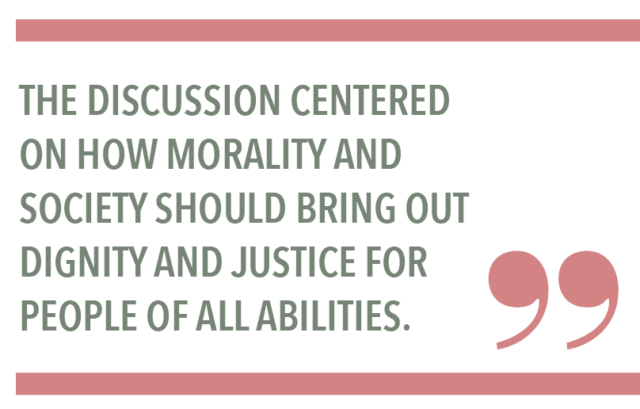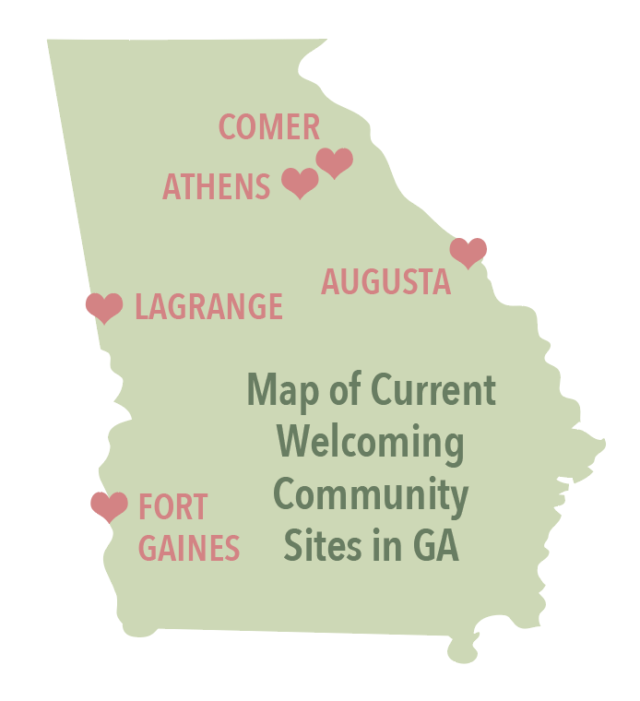The Welcoming Community Dialogue initiative is part of the Real Communities Partnerships (RCP), funded by GCDD and managed by Global Ubuntu. The goal of the RCP is to support community and civic engagement through the creation of inclusive and welcoming communities where people of all abilities are valued equally and are active participants in making the community better for everyone.
The nearly 90 individuals gathered for the day and participated in a collaborative dialogue centered around questions designed to be thought-provoking on what an inclusive and welcoming community should and could be.
Beginning with a presentation on the Universal Declaration of Human Rights by the United Nations, attendees focused on a foundation of law and order based on justice, fairness, truth, freedom and value for every human life, and on the principle of morality: value and practice justice, equity, truth, love, compassion, fairness, freedom, forgiveness, reverence and respect.
“Everyone wants to be treated with dignity and justice. The discussion centered on how morality and society should bring out dignity and justice for people of all abilities. If we want to change our community’s narrative, it’s about human rights. If we want to offer radical hospitality, it’s about human rights. Each human right defined, and each element of the summit, coordinated,” said Sumaya Karimi, the project organizing director for RCP and founder and director of Global Ubuntu.
 At the end of the summit, the five current communities working on changes to make them into official RCP Welcoming Communities – Athens, Augusta, Comer, Fort Gaines and LaGrange – committed to continuing their work and adding new issues to their focus. For example, LaGrange will work on its own summit to look at the intersection of developmental disabilities, racism and homelessness. Atlanta plans to review inclusiveness in the arts, and Comer will lead a dialogue on voting issues and accessibility. In addition, five new communities plan to apply for their cities to become RCP Welcoming Communities in 2020.
At the end of the summit, the five current communities working on changes to make them into official RCP Welcoming Communities – Athens, Augusta, Comer, Fort Gaines and LaGrange – committed to continuing their work and adding new issues to their focus. For example, LaGrange will work on its own summit to look at the intersection of developmental disabilities, racism and homelessness. Atlanta plans to review inclusiveness in the arts, and Comer will lead a dialogue on voting issues and accessibility. In addition, five new communities plan to apply for their cities to become RCP Welcoming Communities in 2020.
“For us, this summit set the tone and foundation of a movement but also showed us all what it is like to be welcoming. Ninety percent of participants left talking about how to bring this welcoming concept to their communities and to be more involved in making this shift happen,” said Karimi.
Global Ubuntu explains the purpose of the dialogues, and the summit by extension, is to pave the way toward an equitable and just society – foundational of welcoming communities – where people across race, ethnicity, culture, class, socioeconomic background, educational status, abilities, gender and religion are treated with dignity and respect. It helps support the communities with technical assistance, financial support and discussion facilitation.
For information on this initiative, check out Global Ubuntu’s website or GCDD’s Real Communities website page.
GOOD TO KNOW
Communicating with People First
People First Language (PFL) is a way of communicating that reflects knowledge and respect for people with disabilities by choosing words that recognize the person first and foremost as the primary reference and not his or her disability.
Geared towards everyday communication and for media outlets, the Georgia Council on Developmental Disabilities (GCDD) developed a People First style guide to promote the usage of People First Language that can be applied to everyday use by professionals and the general public.
In PFL, emphasis is placed on the person first, rather than the disability, thereby putting the focus and subject on the person.
The graphic on this page displays some simple ways to incorporate PFL in everyday use. For more information and the complete style guide, visit GCDD’s People First page.
Not all people with disabilities agree on which language or terminology is preferred. Individuals will vary as to how they refer to themselves and how they would like you to refer to them.
